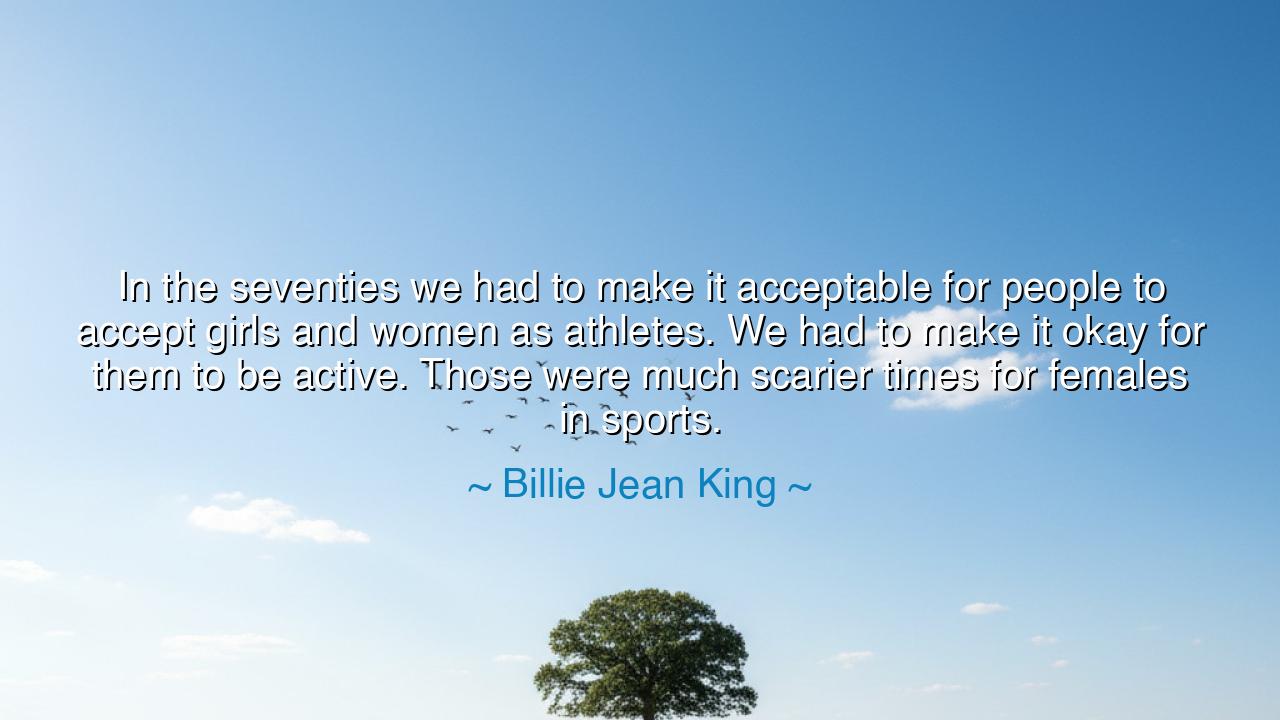
In the seventies we had to make it acceptable for people to
In the seventies we had to make it acceptable for people to accept girls and women as athletes. We had to make it okay for them to be active. Those were much scarier times for females in sports.






The great champion Billie Jean King once declared: “In the seventies we had to make it acceptable for people to accept girls and women as athletes. We had to make it okay for them to be active. Those were much scarier times for females in sports.” These words are not merely the recollection of an athlete, but the testimony of a warrior who fought battles not only on the court but in the soul of society itself. For her, the racket was a sword, and the arena was not just for trophies but for the liberation of half of humankind.
This quote reveals the truth that what is commonplace today was once revolutionary. To see women run, compete, and sweat for victory was not always celebrated—it was feared. The seventies were an age of walls, where females in sports had to scale barriers of prejudice and suspicion. To be active was to be called unfeminine, to be ambitious was to be ridiculed, and to demand equality was to risk exile from the very game one loved. King’s words remind us that courage is often forged in the face of ridicule, and that progress is always bought with sacrifice.
Think of King’s own most famous battle: the “Battle of the Sexes” in 1973, when she faced Bobby Riggs before millions. That match was not merely about tennis—it was about dignity, about whether the world would see women as strong, as capable, as deserving of the same stage as men. When she triumphed, it was not only her opponent she defeated, but the shadow of centuries of dismissal. Her victory was a torch passed to generations of women who would follow, on tracks, in stadiums, on fields, and in gyms.
Her story echoes that of other women who bore the burden of firsts. Consider Katherine Switzer, who in 1967 ran the Boston Marathon when it was forbidden for women. Officials tried to drag her from the course, but she pressed on, step by step, until she crossed the finish line. Like King, she lived in those “scarier times” when female strength was treated as rebellion. Yet from their defiance, the soil of freedom was watered, and today women’s marathons are held across the globe.
The meaning of this quote, then, is clear: it is not enough to be excellent in one’s craft; sometimes the greater calling is to make it acceptable for others to follow. To be the first is to endure scorn so that others may walk in celebration. To be a pioneer is to risk loneliness so that generations unborn may feel belonging. Billie Jean King and her sisters in sport bore this burden, and through their courage, the world shifted.
From this truth flows a lesson for us all: when we face resistance, when the world tells us “you do not belong,” it may be that we are standing at the edge of history. Just as King fought for women’s place in sports, so must we fight in our own arenas—whether in science, art, or justice—to open doors for others. The true measure of our courage is not whether we win for ourselves, but whether our victory makes room for many.
Therefore, let us remember this quote not as mere memory but as living fire. Let us honor the pioneers who endured the “scarier times” by never growing complacent in our own. Let us act with the knowledge that every barrier broken is a seed of freedom sown for the future. And let us rise each day with the spirit of Billie Jean King, knowing that even a game, when played with courage, can change the destiny of the world.






AAdministratorAdministrator
Welcome, honored guests. Please leave a comment, we will respond soon